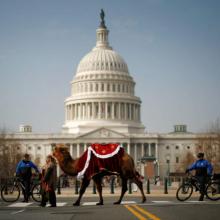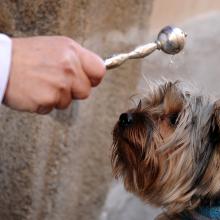Animal Rights
At this time of year, we often see animals subjected to cruel holiday stunts, or treated as living props in our confusing pageantry.
Domino’s Japan recently announced it was canceling its ill-conceived plan to train reindeer to deliver pizza, following a PETA Asia campaign. And just this week, a man was charged with abusing a camel that was part of a hospital’s live Nativity scene in Pikeville, Ky.

Photo via AnnaTamila / Shutterstock
IN MANY WAYS, the modern animal-welfare movement was birthed by evangelicalism.
Given current-day categories and political alignments, this history is surprising. But evangelicalism’s concern for animal welfare began with John Wesley, who many consider the father of evangelicalism. Wesley offered weighty words about animals and their treatment by humans. In his sermon “The General Deliverance,” for example, Wesley laments the plight of animals subjected to human cruelty:
And what a dreadful difference is there, between what they suffer from their fellow-brutes, and what they suffer from the tyrant man! The lion, the tiger, or the shark, gives them pain from mere necessity, in order to prolong their own life; and puts them out of their pain at once: But the human shark, without any such necessity, torments them of his free choice; and perhaps continues their lingering pain till, after months or years, death signs their release.
In Wesley’s lifetime, which spanned most of the 18th century, animals played a central and visible role in most people’s lives. Animals were sources of food and clothing and means of transportation. Sadly, animals were also a common source of entertainment in various forms of brutal blood sports—including bull and bear baiting, dog fighting, and cock throwing. As plentiful paintings, literature, sermons, and tracts from the age show, cruelty to animals was as pervasive as the animals themselves.
The general understanding of animals at the time was gravely influenced by a Cartesian, mechanistic view of the world. The same disciples of the Enlightenment who envisioned God as a distant watchmaker also viewed the “lower creatures” as mere machines. Well into the 19th century, animals were viewed under the law, according to the Animal Legal and Historical Center at Michigan State University, “as items of personal property not much different than a shovel or plow.”

Image via MENATU / Shutterstock
Barrett Duke didn’t grow up with pets and never gave the welfare of animals any serious thought. Then he met Rusty — the golden retriever who stole his heart.
Duke discovered what most animal lovers know: that Rusty was more than just a random assortment of cells wrapped in fur. He had a personality and intelligence and a will that was all his own. When he lost Rusty to cancer, it was like losing a family member.
“Rusty was such an incredible animal, it changed my perspective on God’s creation,” Duke told me.
After two doves released by Pope Francis and two young children were attacked by aggressive predator birds, a leading animal rights group called on the pontiff to stop what they called “outdated traditions.”
The Vatican regularly releases doves as a symbol of peace, and in multiple instances they have been chased and sometimes captured and killed by more aggressive fowl in the area. But Sunday’s events were more noteworthy because the scene of a seagull and a crow swooping in to attack the doves was captured by several of the photographers in St. Peter’s Square as a crowd of tens of thousands — including several thousand children — looked on.
Both white doves managed to escape their predators after a brief tussle, but it’s unclear what ultimately happened to them.
This week, thousands of churches will host a “blessing of the animals” to coincide (more or less) with the Feast of St. Francis of Assisi. I’ve been to several of these, and what I remember best is a lot of barking, bored cats, and uninspired sermons. Most commonly, the sermon follows something like this trajectory: “My Mom/Grandmother/Elderly Friend has sweet little dog. She loves the dog very much. The dog loves her. That dog is the presence of God in her life.” This is followed by a round of not-completely-affirming barks and mews.
The problem is not that this all isn’t true — I’m sure that it is, including the last part. The problem is that it does too little to recognize the complex power of animals in God’s creation, or even in the life of St. Francis. The Saint, after all, engaged the dangerous animals, too, and most famously blessed a wolf.
Let all creation praise! Worried that your pooch won't come with you at the rapture? Anxious that the piety crowd might think your four-legged life partner is short on salvation?
I was happy to read your article in the May issue about food and the ethics of wise consumption (“Shopping for Justice,” by Bethany Spicher Schonberg).
Chickens have evidently found a soft place in the hearts of McDonald's management...


